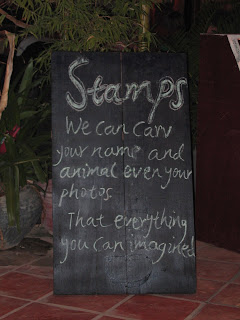Like I said, a few days ago I got invited to a wedding. It was A, a French colleague who has his office down the hall, marrying a local Hong Kong woman. He stopped by to give me my invitation and in the heat of the moment ~ communicating my sympathies ~ I omitted to gauge who else from my department he was inviting.
A few days later, I was having lunch with K, a friend from my department. This guy had not only joined the school the same time as A, but they'd also gone to the same grad school and had been friends there. So the talk turned to the wedding and, inevitably, to the question of what to gift. K, not being from Hong Kong, was as unsure as I was. He though that the safe option given that this was a Cantonese wedding (in a sense) was to gift some cash in a "red pocket" (an auspicious red envelope). As he said that, he wondered what an appropriate amount would be. His metric was -- how much would be enough to cover the cost of one head at the hotel where we'd been invited for the banquet?
I recoiled from that calculation. For me, cash is anyway the lowest form of gift. It signals, "Look, I don't care enough to find something appropriate for you, so run along and buy yourself a trinket." And while I know this is technically irrational, it has solid foundations in theory as well as popular appeal. One of the best-received sessions I teach every year is the one on gift-giving, which talks about the various stages of the gift-giving process. First there's the gestation stage, where the giver plans ahead, thinking about their motivations for giving the gift, how much time and effort they should put into it, the nature of the appropriate gift, the "right" value. Then comes the presentation stage, which isn't just about walking up the recipient and tossing the parcel in their faces, but about the ceremony that accompanies the giving, the attention to the recipient, the unwrapping, the surprise, the often too-obvious demonstrations of joy and thankfulness. And it doesn't end there, since there's the reciprocity stage, where the person who was first the recipient now has to become the giver, and the value and nature of the gift and the specialness of the presentation get factored into the complex calculus of the relationship.
So, given all this theoretical knowledge, I can also appreciate how wedding gifts may be different. The process tends to be a lot more formalized, for one. At my wedding, we'd had two receptions, in two cities. My parents had printed an invitation card that said clearly at the bottom, "No gifts please." (Or words to that effect -- it's been a long time.) Despite that explicit injunction, every other person who attended brought a gift-wrapped parcel. The venue had placed a table behind us, and that table was soon overloaded with layers of boxes. Funny was the gentleman, some professional acquaintance of my father's, who walked in empty-handed to congratulate us, excused himself, disappeared for half an hour, and returned with a gift of his own. Funnier was the fact that when we unwrapped the parcels the next day, we found we had something like eight or ten "lemon sets". I'd never heard of these before but as we learned, they were in fashion then. My parents used them as gifts at weddings they went to over the course of the next few years -- presumably as antiques. Funniest was one of the gifts we hadn't opened -- a large flat square box, at least eighteen inches across, with a photograph of a salver on the cover. My in-laws assumed it was silver and decided it needed to be stored away safely. Much
much later, a bout of house-cleaning brought that box to light again and the decision was made to open it.
It yielded a cheap aluminium tray loaded with two kilograms of heartily-rotten mithai.
Anyway, so that's one thing about the wedding gift that's different from the normal gift. It's formalized, so a lot of that stuff about relationship bonding and reciprocity doesn't
quite hold in the same way. Or else I'd have been waiting for the silver-platter-giver's next invitation. And it leads to all kinds of weird herding behavior -- like the lemon sets we got at that reception, or the six wall-clocks from the other reception. A second way in which wedding gifts are different is that they tend to over-emphasize reciprocity at the cost of bonding. I'm talking about cash. K's idea of gifting an amount commensurate with the per-capita cost of the hotel booking revolted me at first, but then I thought back to what I myself had done at my second reception. The six timely souls who'd gifted us wall-clocks had been in a minority. Here, the culture being different, we'd received *stacks* of envelopes. This was probably the first time I was receiving cash like this (incorruptible me). The whole process had been stylized -- me and TPB on the dais, cascades of relatives rolling up from the left, mumbles of congchulesun, congchulesun, frantic whispers of dive? yes dive! ok dive!, envelope stuffed into my hand, always at waist-level, photographer shouts photo! sighs of relief as orderly line is formed, I pass the envelope behind TPB's back into the outstretched hand of her cousin, who is keeping stock. Round after round after round. And in the evening, after it was all over, I and my new family sat down to keep score. Envelopes were opened. Counts were made. Comments passed. Totals listed and filed away for future reference. I felt like I was looking in at a parallel universe.
A further culture shock, and an even more different look into the world of wedding gifts, came after we moved to the US. Two good friends from grad school were getting married. They sent us the link to their registry. I asked around, discreetly, to convince myself this wasn't a joke. People telling other people not only what they want, but where to get it and how much to pay? Although I didn't know it then, this basically kills of most of the first
two stages of the gift-giving process. Now it's not about the giver any more, or about their relationship with the recipient, it's all about convenience.
An interesting book I'm reading right now asks quite pertinently -- why don't we just do away with all the reception and registry money sinks and instead get the well-wishers to contribute to a down payment on a house for the couple instead? Further, not only does a wedding registry kill off the romance and force you quantify your love for the couple in a metric that is stark naked to everyone concerned, it also discriminates against the slow-movers! When three of us friends got round to looking at the registry concerned, we found that most everything that had been within reach of our grad student budgets was now gone. Obviously grad students tend to have many friends on grad student budgets. We contemplated getting them one wine glass or pillow cover each (
these things get that expensive?!). Ultimately, we pooled our meagre resources and ended up giving a gift that none of us remember.
But maybe that's the way they like it.
But not me.
I can think back to weddings I have attended, and I can remember the gifts I gave and how they were received, and I can look around my house and I can remember who gave us what and how. Ultimately, where my closest friends are concerned, I don't think I'd really have cared whether they gave us any presents or not. Indeed, my wedding invitation said no gifts. But that wasn't a strong enough signal for society, I guess.
I told K that it might be a good idea if he and I pooled our cash contributions and got A a nice gift instead. He readily agreed, then suggested we ask around our department to see who else was invited. I knew B had been, so I asked him and he said yes at one. K found C and she agreed as well. Then we learned D&A were also invited though they may not go, then CA, then AR. The list kept expanding and I kept adding cc's on to the group email that I was trying to co-ordinate. Then at some point one of the new entrants stopped by my office and said -- you know what, I just talked to a good friend who's local, and she said cash in a red pocket would be just fine, so I think I'll go that way.
And with that, the whole gift co-ordination exercise lost all its steam in one get-go.
We all ended up carrying red pockets.
There was a desk outside the reception where they were checking off people's names as they arrived and informing them which table they were seated at.
We all gave our red pockets to the girls at the desk.
Happy marriage, A.












